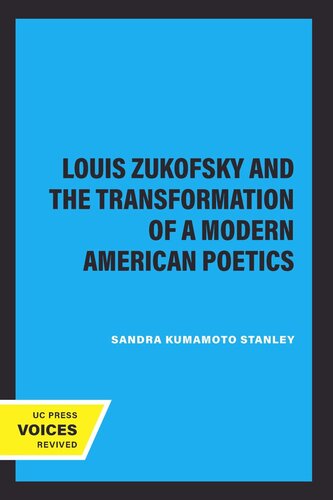

Most ebook files are in PDF format, so you can easily read them using various software such as Foxit Reader or directly on the Google Chrome browser.
Some ebook files are released by publishers in other formats such as .awz, .mobi, .epub, .fb2, etc. You may need to install specific software to read these formats on mobile/PC, such as Calibre.
Please read the tutorial at this link: https://ebookbell.com/faq
We offer FREE conversion to the popular formats you request; however, this may take some time. Therefore, right after payment, please email us, and we will try to provide the service as quickly as possible.
For some exceptional file formats or broken links (if any), please refrain from opening any disputes. Instead, email us first, and we will try to assist within a maximum of 6 hours.
EbookBell Team

5.0
88 reviewsViewing Louis Zukofsky as a reader, writer, and innovator of twentieth-century poetry, Sandra Stanley argues that his works serve as a crucial link between American modernism and post- modernism.
Like Ezra Pound, Zukofsky saw himself as a participant in the transformation of a modern American poetics; but unlike Pound, Zukofsky, the ghetto-born son of an immigrant Russian Jew, was keenly aware of his marginal position in society. Championing the importance of the little words, such as a and the, Zukofsky effected his own proletarian "revolution of the word."
Stanley explains how Zukofsky emphasized the materiality of language, refusing to reduce it to a commodity controlled by an "authorial/authoritarian" self. She also describes his legacy to contemporary poets, particularly such Language poets as Ron Silliman and Charles Bernstein.